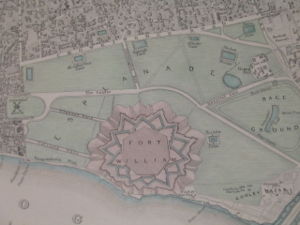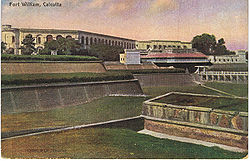Fort William: Difference between revisions
Image added |
|||
| (11 intermediate revisions by 2 users not shown) | |||
| Line 1: | Line 1: | ||
{{Locations_Infobox | |||
|presidency=[[Bengal (Presidency)|Bengal]] | |||
|image= | |||
|coordinates=[https://www.google.com/maps/place/22°33'27.7%22N+88°20'16.8%22E/@22.5577,88.338,15z/data=!4m5!3m4!1s0x0:0x0!8m2!3d22.5577!4d88.338?hl=en 22.5577°N, 88.3380°E°E] | |||
|altitude= 9 m (30 ft) | |||
|presentname= [http://en.wikipedia.org/wiki/Calcutta Kolkata] | |||
|stateprovince= [http://en.wikipedia.org/wiki/West_Bengal West Bengal] | |||
|country= [http://en.wikipedia.org/wiki/India India] | |||
|transport= | |||
}} | |||
[[Image:Fortwilliamplan.jpg|thumb|300px|right|Plan of Fort William, 1844]] | [[Image:Fortwilliamplan.jpg|thumb|300px|right|Plan of Fort William, 1844]] | ||
'''Fort William''' was the main British military garrison in [[Calcutta]]. It is still in use today as the headquarters of the Indian Army Eastern Command. | '''Fort William''' was the main British military garrison in [[Calcutta]]. It is still in use today as the headquarters of the Indian Army Eastern Command. | ||
| Line 17: | Line 27: | ||
===Buildings=== | ===Buildings=== | ||
Buildings inside the fort include: | Buildings inside the fort include: | ||
*St Peter's Church - the fort church built in 1828 | *St Peter's Church - the fort church built in 1828. | ||
*St Patrick's - Catholic Chapel built in 1857 | *St Patrick's - Catholic Chapel built in 1857 | ||
*Military Prison | *Military Prison | ||
*Governor's Residence - later used as the Soldier's Institute and the Garrison School | *Governor's Residence - later used as the Soldier's Institute and the Garrison School | ||
===Burial ground=== | |||
As a result of new construction in the Fort in the 1880s, the ‘old’ burial ground is no longer in existence, and some of the headstones were moved and are now mounted on the walls at South Park Cemetery. <ref>Evers, Maureen. [https://web.archive.org/web/20200118055550/https://lists.rootsweb.com/hyperkitty/list/india.rootsweb.com/thread/2240541/ Kolkata research] ''Rootsweb India Mailing List'' 21 November 2009, now archived. The original advice was from Dr John Roberts, co-author of ''Malabar Christian Memorials at Cannanore, Tellicherry and Mahe 1723-1990'' and ''Nilgiri Hills Christian Memorials 1822-2006'', who had researched in Calcutta.</ref> The ‘new' burial ground is part of the military base and is closed to the public.<ref>Murphy, Sylvia. [https://web.archive.org/web/20200118055402/https://lists.rootsweb.com/hyperkitty/list/india.rootsweb.com/thread/2240456/ Kolkata research] ''Rootsweb India Mailing List'' 18 November 2009, now archived.</ref> | |||
These burial grounds are different burial grounds to those at Bhowanipore Cemetery, the old (separate) part of which is known as the Military Burial Ground. | |||
==External Links== | ==External Links== | ||
*Early plans of Fort William can be found by searching the French archive [[French#ANOM, previously CAOM|ANOM]]'s database [http:// | *Early plans of Fort William can be found by searching the French archive [[French#ANOM, previously CAOM|ANOM]]'s database [http://anom.archivesnationales.culture.gouv.fr/ulysse/ Ulysse]. | ||
*[http://www.columbia.edu/itc/mealac/pritchett/00routesdata/1600_1699/calcutta/fortwilliam/fortwilliam.html Images of Fort William] 'Indian Routes' Prof. Emerita Frances W. Pritchett, Columbia University | |||
*[http://www.bl.uk/onlinegallery/onlineex/apac/other/019wdz000004042u00000000.html 1835 Watercolour: St Peter's Church, Fort William, Calcutta] British Library. Click to enlarge | |||
*[http://www.flickr.com/photos/photohistorytimeline/4517308383/in/set-72157612613850222/ Photograph by Frederick Fiebig - St Peter's Church, Fort William, Calcutta, c 1850] flickr.com | |||
*[http://www.bl.uk/onlinegallery/onlineex/apac/photocoll/t/019pho0000897s1u00002000.html Photograph: The Dalhousie Barracks & part of Staff Barracks, Fort William, [Calcutta<nowiki>]</nowiki> c 1880s] British Library. Click to enlarge | |||
*[https://web.archive.org/web/20160412122408/http://imagesofasia.com/html/india/dalhousie-barrack.html Postcard: Calcutta. Dalhousie Barrack Fort William] imagesofasia.com, now archived. | |||
*[http://www.kingsownmuseum.com/galleryaccommodation01.htm Photo Gallery: Accommodation for Soldiers and Officers: Colonial Buildings of the 19th Century] King's Own Royal Regiment Museum. Scroll down to two images of Fort William, one of which refer to “Queen's Barracks, St. Peter's Barracks, Dalhousie Barracks” | |||
===Historical books online=== | ===Historical books online=== | ||
*''Indian Records Series: Old Fort William in Bengal'' by CR Wilson Archive.org 1906 [http://www.archive.org/stream/oldfortwilliami00wilsgoog#page/n7/mode/1up Volume 1], [http://www.archive.org/stream/oldfortwilliami00unkngoog#page/n9/mode/1up Volume 2] | *''Indian Records Series: Old Fort William in Bengal'' by CR Wilson Archive.org 1906 [http://www.archive.org/stream/oldfortwilliami00wilsgoog#page/n7/mode/1up Volume 1], [http://www.archive.org/stream/oldfortwilliami00unkngoog#page/n9/mode/1up Volume 2] | ||
:"A Short History of Old Fort William in Bengal" by the late C R Wilson, ''Bengal Past and Present''. Originally appeared in the ''Indian Church Review'' of 1901 and 1902. Archive.org | |||
:[https://archive.org/details/bengal-past-present-1907-vol-1/page/n52/mode/2up "Part I" pages 30-46] ''Bengal Past and Present Volume 1, July 1907 '' | |||
:[https://archive.org/details/bengal-past-present-1907-vol-1/page/n129/mode/2up "Part II" pages 93-111] ''Bengal Past and Present Volume 1, July 1907'' | |||
:[https://archive.org/details/in.ernet.dli.2015.500670/page/n5/mode/2up "Part III" pages 1-16] ''Bengal Past and Present, Volume 2 January 1908'' | |||
*[http://books.google.com.au/books?id=oKAEAAAAQAAJ&pg=PA284 Fort William], page 284 ''Army Medical Department: Report for the Year 1862'' Google Books | |||
*[https://archive.org/stream/b21452404#page/346/mode/2up Fort William] page 347 ''Report of the Commissioners Appointed to Inquire into the Sanitary State of the Army in India : with Abstract of Evidence, and of Reports Received from Indian Military Stations'' 1864 Archive.org | |||
*[https://archive.org/details/dli.calcutta.04031/page/n95/mode/2up "Scraps from Fort William Regimental History"] by H Hobbs pages 90-104 ''Bengal Past and Present Volume 52 July-December 1936''. Archive.org. | |||
:[https://archive.org/details/in.ernet.dli.2015.501563/page/n13/mode/2up "Scraps from Fort William Regimental History"] by H Hobbs pages 7-30 ''Bengal Past and Present Volume 53 January-June 1937'' Archive.org | |||
:[https://archive.org/details/in.ernet.dli.2015.501563/page/n113/mode/2up "Scraps from Fort William Regimental History"] by H Hobbs pages 100-123 ''Bengal Past and Present Volume 53 January-June 1937''. Archive.org. | |||
== References == | |||
<references /> | |||
Latest revision as of 05:14, 4 December 2022
| Fort William | |
|---|---|
| [[Image:|250px| ]] | |
| Presidency: Bengal | |
| Coordinates: | 22.5577°N, 88.3380°E°E |
| Altitude: | 9 m (30 ft) |
| Present Day Details | |
| Place Name: | Kolkata |
| State/Province: | West Bengal |
| Country: | India |
| Transport links | |

Fort William was the main British military garrison in Calcutta. It is still in use today as the headquarters of the Indian Army Eastern Command.
The Old Fort
Named for William III of England, the fort was completed in 1806 and was the site of the British factory at Calcutta. This fort had the guard room that became known as the Black Hole of Calcutta, where British prisoners were held after the fort was captured by the Nawab of Bengal in 1756 (see Tony Fuller's articles in FIBIS Journals 1&2).
The original fort was further north, but was relocated to the present site on the Maidan after the Battle of Plassey. The old fort would later be used as a customs house.
The New Fort William
The new Fort William was built by Robert Clive at a cost of £2,000,000 and was completed in 1773. Situated on the site known as the Maidan, it is octagonal in shape and covers an area of 2 square miles. Three sides of the fort face the Hoogly River and there are six gates.

Garrison
Two infantry regiments were stationed at the fort, one British, one native, as well as a Royal Artillery company.
Buildings
Buildings inside the fort include:
- St Peter's Church - the fort church built in 1828.
- St Patrick's - Catholic Chapel built in 1857
- Military Prison
- Governor's Residence - later used as the Soldier's Institute and the Garrison School
Burial ground
As a result of new construction in the Fort in the 1880s, the ‘old’ burial ground is no longer in existence, and some of the headstones were moved and are now mounted on the walls at South Park Cemetery. [1] The ‘new' burial ground is part of the military base and is closed to the public.[2]
These burial grounds are different burial grounds to those at Bhowanipore Cemetery, the old (separate) part of which is known as the Military Burial Ground.
External Links
- Early plans of Fort William can be found by searching the French archive ANOM's database Ulysse.
- Images of Fort William 'Indian Routes' Prof. Emerita Frances W. Pritchett, Columbia University
- 1835 Watercolour: St Peter's Church, Fort William, Calcutta British Library. Click to enlarge
- Photograph by Frederick Fiebig - St Peter's Church, Fort William, Calcutta, c 1850 flickr.com
- Photograph: The Dalhousie Barracks & part of Staff Barracks, Fort William, [Calcutta] c 1880s British Library. Click to enlarge
- Postcard: Calcutta. Dalhousie Barrack Fort William imagesofasia.com, now archived.
- Photo Gallery: Accommodation for Soldiers and Officers: Colonial Buildings of the 19th Century King's Own Royal Regiment Museum. Scroll down to two images of Fort William, one of which refer to “Queen's Barracks, St. Peter's Barracks, Dalhousie Barracks”
Historical books online
- "A Short History of Old Fort William in Bengal" by the late C R Wilson, Bengal Past and Present. Originally appeared in the Indian Church Review of 1901 and 1902. Archive.org
- "Part I" pages 30-46 Bengal Past and Present Volume 1, July 1907
- "Part II" pages 93-111 Bengal Past and Present Volume 1, July 1907
- "Part III" pages 1-16 Bengal Past and Present, Volume 2 January 1908
- Fort William, page 284 Army Medical Department: Report for the Year 1862 Google Books
- Fort William page 347 Report of the Commissioners Appointed to Inquire into the Sanitary State of the Army in India : with Abstract of Evidence, and of Reports Received from Indian Military Stations 1864 Archive.org
- "Scraps from Fort William Regimental History" by H Hobbs pages 90-104 Bengal Past and Present Volume 52 July-December 1936. Archive.org.
- "Scraps from Fort William Regimental History" by H Hobbs pages 7-30 Bengal Past and Present Volume 53 January-June 1937 Archive.org
- "Scraps from Fort William Regimental History" by H Hobbs pages 100-123 Bengal Past and Present Volume 53 January-June 1937. Archive.org.
References
- ↑ Evers, Maureen. Kolkata research Rootsweb India Mailing List 21 November 2009, now archived. The original advice was from Dr John Roberts, co-author of Malabar Christian Memorials at Cannanore, Tellicherry and Mahe 1723-1990 and Nilgiri Hills Christian Memorials 1822-2006, who had researched in Calcutta.
- ↑ Murphy, Sylvia. Kolkata research Rootsweb India Mailing List 18 November 2009, now archived.